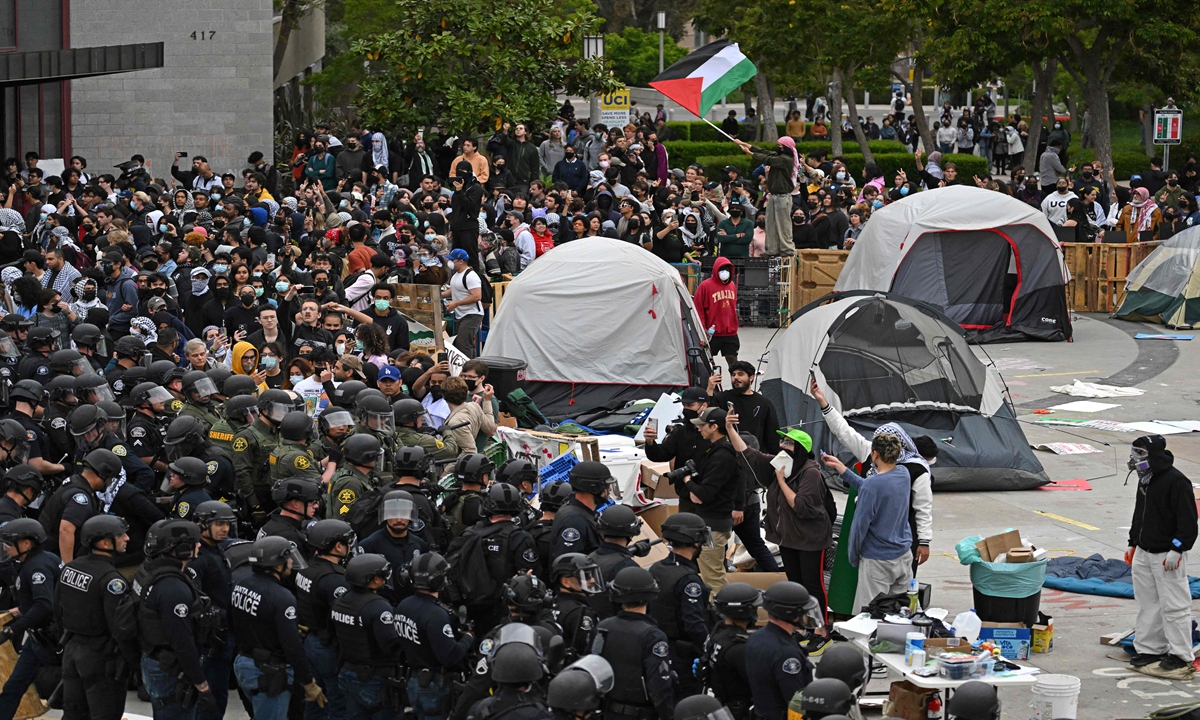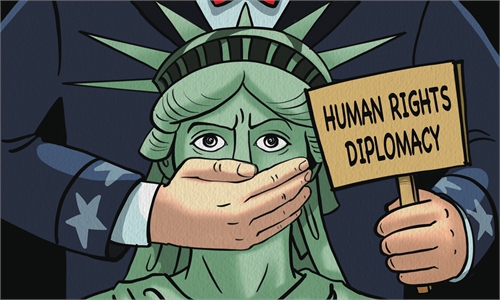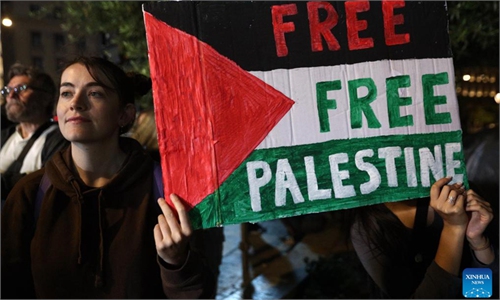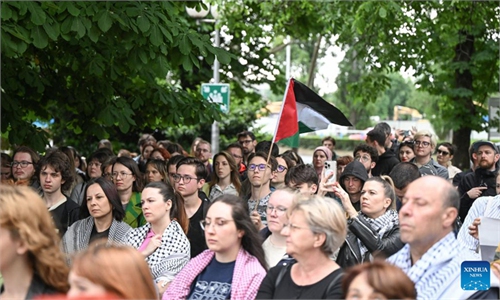
Police clear encampment as they crack down on students protesting against the US' policy in the Israel-Palestine conflict, at the University of California, in Irvine, California on May 15, 2024. Photo: VCG
Editor's Note:
As the Israel-Palestine conflict continues, pro-Palestine student protests on US campuses are calling attention to US policies in the region and challenging university administrators to divest. Why such protests erupt from the political spectrum to university students? What does it show about US policy and US image? Global Times (GT) reporter Wang Wenwen talked to Jason Cohen (Cohen) from City University of New York and student advisor Brandon Gonzalez (Gonzalez) over these issues.
GT: Why do you participate in the encampment?
Cohen: As part of the Gaza consolidating campaigns, what we aimed to achieve was to push the university to recognize the rights of Palestinian nationals and the legitimacy of the Palestinian national struggle. Because at my university, the head wouldn't even say the word Palestine. All he uses is Hamas or Gaza. We have been just protesting and protesting and there's been no movement at all by the administration. All they've done is send more cops at us, whether on the university grounds or in just the public streets. The other goal is to force them to divest from companies that make profit from expansion of Israeli settler colonialism and kill Palestinians, and also to disconnect our university from all imperialism of the US. We also called for the end of the CIA being on campus, because it's all part of the same struggle.
Gonzalez: There are a lot of us who are ready and willing to pull those funds that we provide those schools until they disclose where their money is going, essentially divest from the war machine and imperial aggression in the world and divest from the sort of the projects that are consistently being built in our universities where they're funding and creating programming for whether it's imperial aggression in East Asia, in the Middle East and in South China Sea. We're trying our best to disclose that information - where those funds are going and where they come from, and following up with their escalation tactics and with these escalation tactics, we're hoping that we're just hoping for the best in that strategy and a free, liberated Palestine.
At least with the South China Sea, the imperialist aggression of the West, specifically the US and its hegemonic partners in the region who have positioned themselves as the sole champions of human rights and world democracy. But the US is just a global machine, a global police force that is consistently hounding and brutalizing and bombing and slaughtering civilians, whether it was during the Korean War militarizing that peninsula or militarizing the strait between Taiwan and Chinese mainland or militarizing borders at our southern border with Mexico.
All of these are inherently violent and imperialist in every sense of the word. It's not an exaggeration. Even before the start of the War on Terror, but specifically with the War on Terror, the way that we've surveilled our own civilians who are Muslim, Arab black or Arab civilians has just shown that the brutality that we detest globally is the same brutality and the same tactics we use here at home and abroad.
So with that contradiction, it's up to us as students and as people here in the imperial core to call that out, shame that and demand an end to a complete cessation of imperialist aggression. Specifically in the case of China with the tariffs that this government has imposed is an aggressive act, just as its aggressive acts against Russia in the Ukraine war, and its aggressive acts in funding and arming Israel and its brutality against Palestinians even before October 7 but since 1948, the inception of the Zionist Entity.
GT: What do you think of the US policy toward Israel and the Middle East?
Cohen: The US supports Israel because Israel acts as a beachhead in the Middle East for imperialism and destabilizes the Iraqi, Iranian and other progressive governments that are trying to break away from the unipolar US world.
The US policy in the Middle East has completely failed. Maybe for the US itself and the bourgeoisie, it has shown a lot of profits. But overall, it is a dying policy, because no matter what the US can continue using its drones to either attack Yemen, or to continuously try and subvert other states using color evolution tactics, we are seeing a rise in anti-imperialist consciousness, not just in Palestine, but even throughout Jordan, Saudi Arabia and so on, and that the people are supporting the axis of resistance and the governments that will protect them and will lead to a separate development, not necessarily constructed by US interests.
GT: We have seen some US officials resign because of the US policy of Israel. And now this protest wave has spread to the students. What do you think of this trend from politicians to students?
Cohen: I think it reflects that within the US, there is a definite change in consciousness and a definitely change in our knowledge of what the real basis of US policy and what so-called US democracy has historically and contemporarily brought to the world. It shows that the Palestine solidarity movement on the ground, no matter what the oppression has been and the repression by the state apparatus has been, we are actually kind of winning in the media war and showing that the Palestinian national struggle is a moral and legitimate struggle. I think many in the US have seen it.
Our movement has shaken the US image on the world stage. We're always supposed to have those bourgeois democratic rights, free speech, free demonstrations, and free press. The US always comes out with the ridiculous words that "we need to protect the rest of the world for freedom and democracy." How can you continue to claim that and then be telling to Israel that we'll give you more weapons?
Gonzalez: I definitely think it has to do with the class consciousness that was being built in 2020 with George Floyd. And then even prior to that with the recession, when we saw the Occupy Wall Street movement. All of these things happen not just in a bubble, but are cyclical.
And we have to thank our predecessors for being bold enough and brash enough to denounce our violence, whether it's Vietnam, whether it's the bombing of Cambodia and Laos, any of these conflicts that we've been engaged with even before, when we decided to become the global police and the global hegemony. It's our moral obligation as working people of this country to denounce that violence and terror that's used with our money. Imperial aggression is no longer going to be accepted. The US is not a moral nation and has never been an immoral nation since its inception.
GT: How does the global response to the Russia-Ukraine conflict and the Israel-Palestine conflict contribute to building multipolarity of the world?
Gonzalez: This trend of building multipolarity is exactly what we as the Global North need. The imperial core here, us in the belly of the beast, especially here in New York, being in the financial capital, it is our obligation to support and build that multipolar world. The anti-imperialist movement and the anti-war movement isn't necessarily a call for continuing of the same singular peace of the US being the main power on the stage, but it's to incorporate other nations and making sure that we have equitable infrastructure with each other and everything is equitable across the border and that the US isn't the sole beneficiary of everything and anything as it relates to capital, and that we're sharing in this global market, not global market in terms of economics, but global market in terms of just us as human beings like that internationalist approach to each other and humanity.



